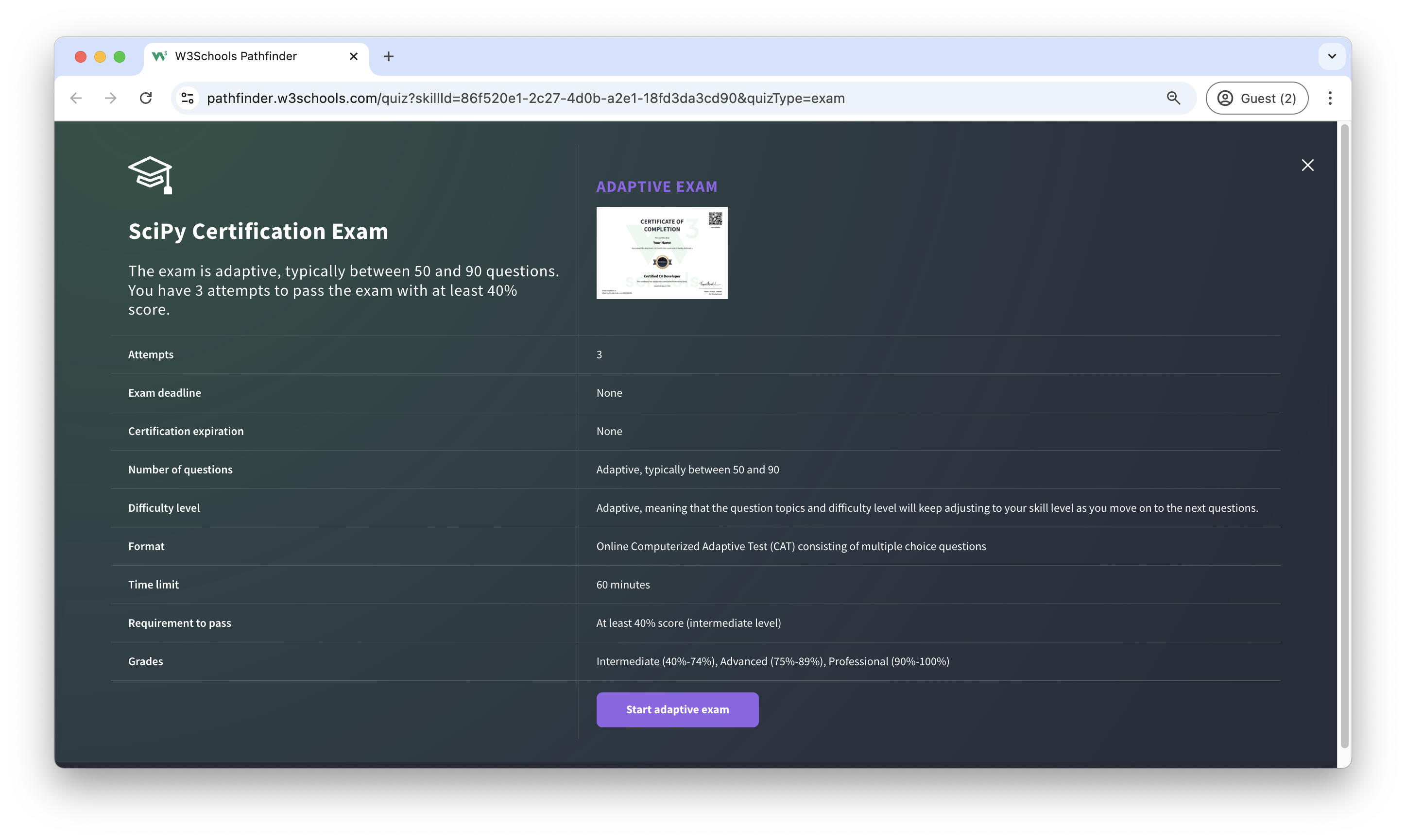SciPy Syllabus
Introduction
The W3Schools SciPy Tutorial is comprehensive and beginner-friendly.
It will give you a fundamental knowledge of scientific computing with Python.
It is designed for beginners and requires basic Python and NumPy knowledge.
The content has been carefully made to be bite-sized, simple, and easy to understand.
The content has been proven by millions of users over the years. It is updated and improved frequently.
The syllabus outline and its sequence are structured so you can learn SciPy step by step, from basic functions to advanced scientific computing.
Learning Outcomes
- Learn SciPy Introduction
- Learn SciPy Getting Started
- Learn SciPy Constants
- Learn SciPy Optimizers
- Learn SciPy Sparse Data
- Learn SciPy Graphs
- Learn SciPy Spatial Data
- Learn SciPy Matlab Arrays
- Learn SciPy Interpolation
- Learn SciPy Statistical Significance Tests
Note: Are you a teacher teaching SciPy? W3Schools Academy is a toolbox of features that can help you teach. It offers classroom features such as pre-built study plans, classroom administration and much more. Read more about Academy here.
Which Subjects Are SciPy Relevant For?
- Scientific Computing:
SciPy can be used for scientific calculations. - Data Analysis:
SciPy provides tools for analyzing data. - Signal Processing:
SciPy excels at processing signals. - Image Processing:
SciPy offers powerful image manipulation tools. - Optimization:
SciPy includes various optimization algorithms. - Engineering:
SciPy is widely used in engineering applications. - Research:
SciPy supports scientific research workflows.
Activities
In this tutorial we offer different activities for you to learn SciPy for free:
Sign in to Track Progress
You can also create a free account to track your progress.
As a signed-in user, you get access to features such as:
- Learning paths
- Sandbox and lab environments
- Achievements
- And much more!
Overview of the Modules
Sandbox and Lab Environment
SciPy, like any scientific library, is best learned through hands-on practice.
Try this example using our editor:
Example
How many cubic meters are in one liter:
from scipy import constants
print(constants.liter)
Try it Yourself »
If you want to explore more and host your project, we have a feature called Spaces that allows you to practice SciPy computations for free.
Here you get a secure sandbox environment called Spaces, where you can practice scientific computing and test algorithms in real-time.
Spaces allow you to test, analyze, and visualize data. This includes a W3Schools subdomain, hosting, and secure SSL certificates.
Spaces require no installation and run directly in the browser.
Features include:
- Collaboration
- File navigator
- Terminal & log
- Package manager
- Database
- Environment manager
- Analytics

SciPy Certification
W3Schools offers an end-of-pathway certification program.
Here you can take exams to get certified.
The SciPy exam is a test that summarizes the W3Schools SciPy syllabus.
The certification exam is adaptive and graded; students will get a grade from intermediate, advanced to professional.
Are You a Teacher?
Are you interested in learning how you can use W3Schools Academy to Teach SciPy?
Watch a demo of W3Schools Academy. You'll see how it works, and discover how it can make teaching programming easier and more engaging.



